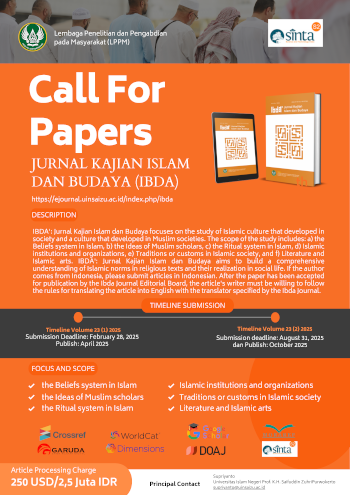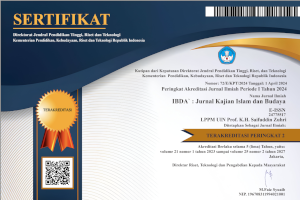Students Resilience Through Reciting Hizib Sirrul Mashun as a Living Qur'an Tradition in Pondok Pesantren Al-Hidayah Purwokerto
DOI:
https://doi.org/10.24090/ibda.v20i1.5895Keywords:
Resilience, Santri, Pondok Pesantren Al-Hidayah, Hizb Sirrul MashunAbstract
This article examines the reciting Hizb Sirrul Mashun as a living Qur'an tradition at Pondok Pesantren Al-Hidayah, Purwokerto. It is field research with a descriptive-qualitative method, and the researcher gets research data through in-depth interviews, observations, and studies of related documents. He uses data reduction, display data, and conclusions in analyzing data. The results are, First, students (Santri) recite Hizb Sirrul Mashun during Coronavirus disease (COVID-19) pandemic whose goal is a dynamic process of positive adaptation to adversity, Second, fasting for seven consecutive days—for students who are just practicing. During the implementation process, if the students fail both in reciting the Hizb or the fast, They repeat it from the beginning. The senior student leads the reciting at the An-Nur Karangsuci Mosque. Practically, the students recite Hizb Sirrul Mashun at the Pondok Pesantren Al-Hidayah Karangsuci Purwokerto after the congregational evening prayer on Friday night. Third, based on the Sociological theory of Karl Mannheim, the meaning contained in the reciting of Hizb Sirrul Mashun includes three aspects, namely objective, expressive, and documentary. The objective meaning emphasizes that the reciting of Hizb Sirrul Mashun is also strongly influenced by the social support implemented in Kyai's words. One of the factors supporting resilience is social support. The expressive meaning from the students (Santri) emphasizes that other factors influence the formation of resilience, namely religiosity and spirituality.Downloads
Download data is not yet available.
References
Abdullah, M. (2012). Fungsi Wirid dan Hizib Dalam Sastra Lisan Pesantren (Studi Kasus Wirid Asma’ul Husna dan Hizib Lathif di Brangsong Kendal). Universitas Diponegoro.
Adler, A. B., & Saboe, K. N. (2017). How Organisations and Leaders Can Build Resilience: Lessons from high-risk occupations. In Managing for Resilience. Routledge.
Al-Baihaqi. (1408). Dalail al-Nubuwwah. Dar al-Kutub al-‘Ilmiyyah.
As-Syafi’i, J. A. (n.d.). Al- Itqan Fi ‘Ulumil Qur’an. Darul Fikri.
Barro, R. J., Ursúa, J. F., & Weng, J. (2020). The Covid-19virus and the Great Influenza Pandemi: Lessons from the “Spanish Flu” for the Covid-19virus’s Potential Effects on Mortality and Economic Activity (Working Paper No. 26866; Working Paper Series). National Bureau of Economic Research. https://doi.org/10.3386/w26866
Brewer-Smyth, K., & Koenig, H. G. (2014). Could spirituality and religion promote stress resilience in survivors of childhood trauma? Issues in Mental Health Nursing, 35(4), 251–256. https://doi.org/10.3109/01612840.2013.873101
Budiyono, A. (2021). Konseling di Lembaga Pemasyarakatan. STAIN Press.
Budiyono, A., Sugiharto, D., Sutoyo, A., & Rachman, M. (2020). Empirical Study: Cognitive Behavior Therapy (CBT) And Resilience of Prisoners before Being Released. International Journal of Innovative Science and Research Technology, 5(7), 1085–1091. https://doi.org/10.38124/IJISRT20JUL572
Deb, S., McGirr, K., & Sun, J. (2016). Spirituality in Indian University Students and its Associations with Socioeconomic Status, Religious Background, Social Support, and Mental Health. Journal of Religion and Health, 55(5), 1623–1641. https://doi.org/10.1007/s10943-016-0207-x
Diclemente, R. J., & John, S. S. (2009). Adolescent health; Understanding and preventing risk behaviors. Jossey-Bass.
Fathurrosyid, F. (2015). Tipologi Ideologi Resepsi Al quran di Kalangan Masyarakat Sumenep Madura. El-harakah (terakreditasi), 17(2), 218–239. https://doi.org/10.18860/el.v17i2.3049
Gomez-Molinero, R., Zayas, A., Ruiz-González, P., & Guil, R. (2018). Optimism and resilience among university students. International Journal of Developmental and Educational Psychology. Revista INFAD de Psicología., 1, 147. https://doi.org/10.17060/ijodaep.2018.n1.v1.1179
Harapandi, D., A’dam, S., & Habib, M. (2010). Reposisi Tarekat Hizib NW dalam Tarekat Mu’tabarah di Indonesia. Penamadani bekerjasama dengan STAI Al-Aqidah Al-Hasyimiyah Jakarta.
Hidayat, K. (1996). Memahami Bahasa Agama: Sebuah Kajian Hermeneutik. Paramadina.
Hidayatullah, S. (2017). Nilai-nilai Pendidikan Karakter Santri dalam Pelaksanaan Kegiatan Muroja’ah Juz ‘Amma di Pondok Pesantren Al-Hidayah Karangsuci Purwokerto. IAIN Purwokerto.
Hou, X.-L., Wang, H.-Z., Guo, C., Gaskin, J., Rost, D. H., & Wang, J.-L. (2017). Psychological resilience can help combat the effect of stress on problematic social networking site usage. Personality and Individual Differences, 109, 61–66. https://doi.org/10.1016/j.paid.2016.12.048
Ilyas, H. (2004). Studi Kitab Tafsir. Teras.
Imzi, A. H. H. (2017). Kaidah-Kaidah Penafsiran Pedoman Bagi Pengkaji Alquran. Lingkar Studi Alquran.
Iser, W. (1978). The Act of Reading; A Theory of Aesthetic Response. John Hopkins University Press.
Iswatunnisa, K. (2015). Keserasian Bunyi Akhir dalam Alquran Surah al-Insyirah (Kajian Aspek Fonologi terhadap Alquran). UIN Sunan Kalijaga Yogyakarta.
Javanmard, G. H. (2013). Religious Beliefs and Resilience in Academic Students. Procedia - Social and Behavioral Sciences, 84, 744–748. https://doi.org/10.1016/j.sbspro.2013.06.638
Jin, Y.-H., Cai, L., Cheng, Z.-S., Cheng, H., Deng, T., Fan, Y.-P., Fang, C., Huang, D., Huang, L.-Q., Huang, Q., Han, Y., Hu, B., Hu, F., Li, B.-H., Li, Y.-R., Liang, K., Lin, L.-K., Luo, L.-S., Ma, J., … , for the Zhongnan Hospital of Wuhan University Novel Covid-19virus Management and Research Team, Evidence-Based Medicine Chapter of China International Exchange and Promotive Association for Medical and Health Care (CPAM). (2020). A rapid advice guideline for the diagnosis and treatment of 2019 novel covid-19virus (2019-nCoV) infected pneumonia (standard version). Military Medical Research, 7(1), 4. https://doi.org/10.1186/s40779-020-0233-6
Jurjewicz, H. (2016). How spirituality leads to resilience a case study of immigrants. European Journal of Science and Theology, 12(4).
Karadag, E., Ugur, O., Mert, H., & Erunal, M. (2019). The Relationship Between Psychological Resilience and Social Support Levels in Hemodialysis Patients. The Journal of Basic and Clinical Health Sciences, 3. https://doi.org/10.30621/jbachs.2019.469
Madjid, M., Safavi-Naeini, P., Solomon, S. D., & Vardeny, O. (2020). Potential Effects of Covid-19viruses on the Cardiovascular System: A Review. JAMA Cardiology, 5(7), 831–840. https://doi.org/10.1001/jamacardio.2020.1286
Maliki, M. ‘alawi. (n.d.). Mafahim Yajibu an-Tushoha. Darr Jawami’ul Kalim.
Mannheim, K. (1954). Essay on The Sociology of Knowledge. Brodway House.
Missasi, V., & Izzati, I. D. C. (2019). Faktor-faktor yang Mempengaruhi Resiliensi. Prosiding Seminar Nasional Magister Psikologi.
Noor, M., & Muslihan, H. (2004). Mengenal Tarekat Hizib Nahdlatul Wathan. Pondok Pesantren Nahdlatul Wathan Jakarta.
Noor, M., Muslihan, H., & Zuhdi, M. H. (2004). Visi Kebangsaan Religius; Refleksi Pemikiran dan Perjuangan Tuan Guru Kyai Haji Muhammad Zainuddin Abdul Madjid 1904-1997. Logos Wacana Ilmu.
Pengasuh 1. (2020). [Personal communication].
Permana, D. (2018). Peran Spiritualitas dalam Meningkatkan Resiliensi pada Residen Narkoba. Syifa al-Qulub, 2(2), 75–88. https://doi.org/10.15575/saq.v2i2.2972
Pradopo, R. D. (2007). Beberapa Teori Sastra: Metode Kritik dan Penerapannya. Pustaka Pelajar.
Qayyim, I. (n.d.). Zaad Al-Ma’ad Fi Hadyi Khairil Ibad. Beragam.
Ratna, N. K. (2009). Teori, Metode, dan Teknik Penelitian Sastra. Pustaka Pelajar.
Reisnick, B., Gwyther, L. P., & Roberto, K. (2011). Resilience in Aging: Concepts, research, and outcomes. Springer Science & Business Media.
Reivich, K., & Shatte, A. (2002). The resilience faktor: 7 essential skills for overcoming life’s inevitable obstacle. Broadway Books.
Ruisoto, P., Contador, I., Fernández-Calvo, B., Serra, L., Jenaro, C., Flores, N., Ramos, F., & Rivera-Navarro, J. (2020). Mediating effect of social support on the relationship between resilience and burden in caregivers of people with dementia. Archives of Gerontology and Geriatrics, 86, 103952. https://doi.org/10.1016/j.archger.2019.103952
Rutter, M. (2006). Implications of resilience concepts for scientific understanding. Annals of the New York Academy of Sciences, 1094, 1–12. https://doi.org/10.1196/annals.1376.002
Santri 1. (2020). [Personal communication].
Santri 2. (2020). [Personal communication].
Santri 3. (2020). [Personal communication].
Santri 4. (2020). [Personal communication].
Santri 5. (2020). [Personal communication].
Santri 6. (2020). [Personal communication].
Salim, & Syahrun. (2012). Metodologi Penelitian Kualitatif. Ciptapustaka Media.
Shihab, M. Q. (1999). Menyelami Kalam Tuhan. Pustaka Pelajar.
Soehadha, Mohd. (2012). Metode Penelitian Sosial Kualitatif untuk Studi Agama. SUKA Press.
Umar. (2010, January 9). Definisi Ilmu Hizib. RASA SEJATI. https://rasasejati.id/kajian-ilmu-ghoib/hizib-ratib/
Veselska, Z., Geckova, A. M., Orosova, O., Gajdosova, B., van Dijk, J. P., & Reijneveld, S. A. (2009). Self-esteem and resilience: The connection with risky behavior among adolescents. Addictive Behaviors, 34(3), 287–291. https://doi.org/10.1016/j.addbeh.2008.11.005
Waxman, H. C., & Yolanda, N. P. (2013). Review of research on educational resilience. Institute of Education Science.
Wong, P., Wong, L., & Scott, C. (2006). Beyond Stress and Coping: The Positive Psychology of Transformation (pp. 1–26). https://doi.org/10.1007/0-387-26238-5_1
Wu, A. W., Connors, C., & Everly, G. S. (2020). COVID-19: Peer Support and Crisis Communication Strategies to Promote Institutional Resilience. Annals of Internal Medicine, 172(12), 822–823. https://doi.org/10.7326/M20-1236
Zaman, A. R. B. (2019). Resepsi Alquran Di Pondok Pesantren Karangsuci Purwokerto [Skripsi, IAIN Purwokerto]. http://repository.iainpurwokerto.ac.id/5114/
Zaman, A. R. B. (2020). Tipologi dan simbolisasi resepsi Alquran di pondok pesantren miftahul huda rawalo banyumas. Aqlam: Journal of Islam and Plurality, 5(2), Article 2. https://doi.org/10.30984/ajip.v5i2.1375
Adler, A. B., & Saboe, K. N. (2017). How Organisations and Leaders Can Build Resilience: Lessons from high-risk occupations. In Managing for Resilience. Routledge.
Al-Baihaqi. (1408). Dalail al-Nubuwwah. Dar al-Kutub al-‘Ilmiyyah.
As-Syafi’i, J. A. (n.d.). Al- Itqan Fi ‘Ulumil Qur’an. Darul Fikri.
Barro, R. J., Ursúa, J. F., & Weng, J. (2020). The Covid-19virus and the Great Influenza Pandemi: Lessons from the “Spanish Flu” for the Covid-19virus’s Potential Effects on Mortality and Economic Activity (Working Paper No. 26866; Working Paper Series). National Bureau of Economic Research. https://doi.org/10.3386/w26866
Brewer-Smyth, K., & Koenig, H. G. (2014). Could spirituality and religion promote stress resilience in survivors of childhood trauma? Issues in Mental Health Nursing, 35(4), 251–256. https://doi.org/10.3109/01612840.2013.873101
Budiyono, A. (2021). Konseling di Lembaga Pemasyarakatan. STAIN Press.
Budiyono, A., Sugiharto, D., Sutoyo, A., & Rachman, M. (2020). Empirical Study: Cognitive Behavior Therapy (CBT) And Resilience of Prisoners before Being Released. International Journal of Innovative Science and Research Technology, 5(7), 1085–1091. https://doi.org/10.38124/IJISRT20JUL572
Deb, S., McGirr, K., & Sun, J. (2016). Spirituality in Indian University Students and its Associations with Socioeconomic Status, Religious Background, Social Support, and Mental Health. Journal of Religion and Health, 55(5), 1623–1641. https://doi.org/10.1007/s10943-016-0207-x
Diclemente, R. J., & John, S. S. (2009). Adolescent health; Understanding and preventing risk behaviors. Jossey-Bass.
Fathurrosyid, F. (2015). Tipologi Ideologi Resepsi Al quran di Kalangan Masyarakat Sumenep Madura. El-harakah (terakreditasi), 17(2), 218–239. https://doi.org/10.18860/el.v17i2.3049
Gomez-Molinero, R., Zayas, A., Ruiz-González, P., & Guil, R. (2018). Optimism and resilience among university students. International Journal of Developmental and Educational Psychology. Revista INFAD de Psicología., 1, 147. https://doi.org/10.17060/ijodaep.2018.n1.v1.1179
Harapandi, D., A’dam, S., & Habib, M. (2010). Reposisi Tarekat Hizib NW dalam Tarekat Mu’tabarah di Indonesia. Penamadani bekerjasama dengan STAI Al-Aqidah Al-Hasyimiyah Jakarta.
Hidayat, K. (1996). Memahami Bahasa Agama: Sebuah Kajian Hermeneutik. Paramadina.
Hidayatullah, S. (2017). Nilai-nilai Pendidikan Karakter Santri dalam Pelaksanaan Kegiatan Muroja’ah Juz ‘Amma di Pondok Pesantren Al-Hidayah Karangsuci Purwokerto. IAIN Purwokerto.
Hou, X.-L., Wang, H.-Z., Guo, C., Gaskin, J., Rost, D. H., & Wang, J.-L. (2017). Psychological resilience can help combat the effect of stress on problematic social networking site usage. Personality and Individual Differences, 109, 61–66. https://doi.org/10.1016/j.paid.2016.12.048
Ilyas, H. (2004). Studi Kitab Tafsir. Teras.
Imzi, A. H. H. (2017). Kaidah-Kaidah Penafsiran Pedoman Bagi Pengkaji Alquran. Lingkar Studi Alquran.
Iser, W. (1978). The Act of Reading; A Theory of Aesthetic Response. John Hopkins University Press.
Iswatunnisa, K. (2015). Keserasian Bunyi Akhir dalam Alquran Surah al-Insyirah (Kajian Aspek Fonologi terhadap Alquran). UIN Sunan Kalijaga Yogyakarta.
Javanmard, G. H. (2013). Religious Beliefs and Resilience in Academic Students. Procedia - Social and Behavioral Sciences, 84, 744–748. https://doi.org/10.1016/j.sbspro.2013.06.638
Jin, Y.-H., Cai, L., Cheng, Z.-S., Cheng, H., Deng, T., Fan, Y.-P., Fang, C., Huang, D., Huang, L.-Q., Huang, Q., Han, Y., Hu, B., Hu, F., Li, B.-H., Li, Y.-R., Liang, K., Lin, L.-K., Luo, L.-S., Ma, J., … , for the Zhongnan Hospital of Wuhan University Novel Covid-19virus Management and Research Team, Evidence-Based Medicine Chapter of China International Exchange and Promotive Association for Medical and Health Care (CPAM). (2020). A rapid advice guideline for the diagnosis and treatment of 2019 novel covid-19virus (2019-nCoV) infected pneumonia (standard version). Military Medical Research, 7(1), 4. https://doi.org/10.1186/s40779-020-0233-6
Jurjewicz, H. (2016). How spirituality leads to resilience a case study of immigrants. European Journal of Science and Theology, 12(4).
Karadag, E., Ugur, O., Mert, H., & Erunal, M. (2019). The Relationship Between Psychological Resilience and Social Support Levels in Hemodialysis Patients. The Journal of Basic and Clinical Health Sciences, 3. https://doi.org/10.30621/jbachs.2019.469
Madjid, M., Safavi-Naeini, P., Solomon, S. D., & Vardeny, O. (2020). Potential Effects of Covid-19viruses on the Cardiovascular System: A Review. JAMA Cardiology, 5(7), 831–840. https://doi.org/10.1001/jamacardio.2020.1286
Maliki, M. ‘alawi. (n.d.). Mafahim Yajibu an-Tushoha. Darr Jawami’ul Kalim.
Mannheim, K. (1954). Essay on The Sociology of Knowledge. Brodway House.
Missasi, V., & Izzati, I. D. C. (2019). Faktor-faktor yang Mempengaruhi Resiliensi. Prosiding Seminar Nasional Magister Psikologi.
Noor, M., & Muslihan, H. (2004). Mengenal Tarekat Hizib Nahdlatul Wathan. Pondok Pesantren Nahdlatul Wathan Jakarta.
Noor, M., Muslihan, H., & Zuhdi, M. H. (2004). Visi Kebangsaan Religius; Refleksi Pemikiran dan Perjuangan Tuan Guru Kyai Haji Muhammad Zainuddin Abdul Madjid 1904-1997. Logos Wacana Ilmu.
Pengasuh 1. (2020). [Personal communication].
Permana, D. (2018). Peran Spiritualitas dalam Meningkatkan Resiliensi pada Residen Narkoba. Syifa al-Qulub, 2(2), 75–88. https://doi.org/10.15575/saq.v2i2.2972
Pradopo, R. D. (2007). Beberapa Teori Sastra: Metode Kritik dan Penerapannya. Pustaka Pelajar.
Qayyim, I. (n.d.). Zaad Al-Ma’ad Fi Hadyi Khairil Ibad. Beragam.
Ratna, N. K. (2009). Teori, Metode, dan Teknik Penelitian Sastra. Pustaka Pelajar.
Reisnick, B., Gwyther, L. P., & Roberto, K. (2011). Resilience in Aging: Concepts, research, and outcomes. Springer Science & Business Media.
Reivich, K., & Shatte, A. (2002). The resilience faktor: 7 essential skills for overcoming life’s inevitable obstacle. Broadway Books.
Ruisoto, P., Contador, I., Fernández-Calvo, B., Serra, L., Jenaro, C., Flores, N., Ramos, F., & Rivera-Navarro, J. (2020). Mediating effect of social support on the relationship between resilience and burden in caregivers of people with dementia. Archives of Gerontology and Geriatrics, 86, 103952. https://doi.org/10.1016/j.archger.2019.103952
Rutter, M. (2006). Implications of resilience concepts for scientific understanding. Annals of the New York Academy of Sciences, 1094, 1–12. https://doi.org/10.1196/annals.1376.002
Santri 1. (2020). [Personal communication].
Santri 2. (2020). [Personal communication].
Santri 3. (2020). [Personal communication].
Santri 4. (2020). [Personal communication].
Santri 5. (2020). [Personal communication].
Santri 6. (2020). [Personal communication].
Salim, & Syahrun. (2012). Metodologi Penelitian Kualitatif. Ciptapustaka Media.
Shihab, M. Q. (1999). Menyelami Kalam Tuhan. Pustaka Pelajar.
Soehadha, Mohd. (2012). Metode Penelitian Sosial Kualitatif untuk Studi Agama. SUKA Press.
Umar. (2010, January 9). Definisi Ilmu Hizib. RASA SEJATI. https://rasasejati.id/kajian-ilmu-ghoib/hizib-ratib/
Veselska, Z., Geckova, A. M., Orosova, O., Gajdosova, B., van Dijk, J. P., & Reijneveld, S. A. (2009). Self-esteem and resilience: The connection with risky behavior among adolescents. Addictive Behaviors, 34(3), 287–291. https://doi.org/10.1016/j.addbeh.2008.11.005
Waxman, H. C., & Yolanda, N. P. (2013). Review of research on educational resilience. Institute of Education Science.
Wong, P., Wong, L., & Scott, C. (2006). Beyond Stress and Coping: The Positive Psychology of Transformation (pp. 1–26). https://doi.org/10.1007/0-387-26238-5_1
Wu, A. W., Connors, C., & Everly, G. S. (2020). COVID-19: Peer Support and Crisis Communication Strategies to Promote Institutional Resilience. Annals of Internal Medicine, 172(12), 822–823. https://doi.org/10.7326/M20-1236
Zaman, A. R. B. (2019). Resepsi Alquran Di Pondok Pesantren Karangsuci Purwokerto [Skripsi, IAIN Purwokerto]. http://repository.iainpurwokerto.ac.id/5114/
Zaman, A. R. B. (2020). Tipologi dan simbolisasi resepsi Alquran di pondok pesantren miftahul huda rawalo banyumas. Aqlam: Journal of Islam and Plurality, 5(2), Article 2. https://doi.org/10.30984/ajip.v5i2.1375
Downloads
Published
2022-02-15
How to Cite
Budiyono, A. (2022). Students Resilience Through Reciting Hizib Sirrul Mashun as a Living Qur’an Tradition in Pondok Pesantren Al-Hidayah Purwokerto. IBDA` : Jurnal Kajian Islam Dan Budaya, 20(1), 1–24. https://doi.org/10.24090/ibda.v20i1.5895
Issue
Section
Articles
License
Authors who publish with this journal agree to the following terms:
- Authors retain copyright and grant the journal right of first publication with the work simultaneously licensed under a Creative Commons Attribution-ShareAlike License a that allows others to share the work with an acknowledgement of the work's authorship and initial publication in this journal.
- Authors are able to enter into separate, additional contractual arrangements for the non-exclusive distribution of the journal's published version of the work (e.g., post it to an institutional repository or publish it in a book), with an acknowledgment of its initial publication in this journal.
- Authors are permitted and encouraged to post their work online (e.g., in institutional repositories or on their website) before and during the submission process, as it can lead to productive exchanges, as well as earlier and greater citation of published work (See The Effect of Open Access).















